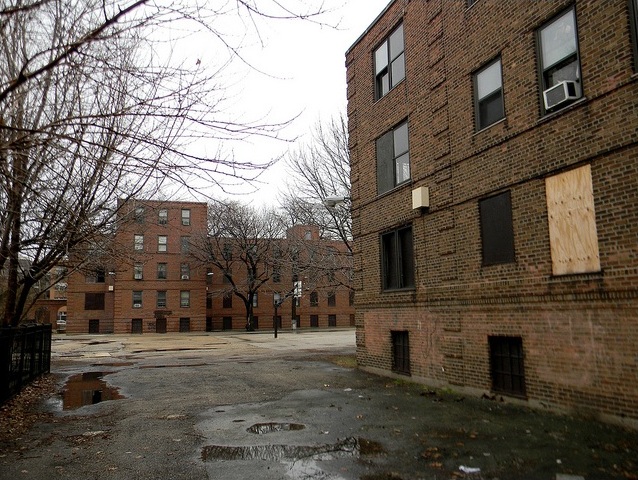CHA Collecting Federal Subsidies On Empty Units
By Chuck Sudo in News on Aug 21, 2012 7:40PM

Lathrop Homes, with an 18 percent occupancy rate, has the most vacancies in the Chicago Housing Authority. (Photo Credit: Gabriel X. Michael)
Chicago Reporter staffer Angela Caputo wrote what should required reading about how the Chicago Housing Authority is collecting subsidies from the Department of Housing and Urban Development on empty units. This is a violation of a HUD order that states public housing authorities must inform them when a unit goes “offline” because of repair or vacancy.
Caputo found that one out of every five of CHA’s 21,204 units is vacant, with the most vacancies in the Lathrop Homes development, 18 percent of the project’s 900 units are occupied. Yet CHA is still collecting subsidies from HUD on the vacant units. Compound this with a waiting list of over 40,000 families trying to obtain an apartment from CHA and it raises the question: “WTF?”
Caputo wrote that CHA justifies their continuing collection of the subsidies by claiming they could be open to litigation if they rent out an apartment or unit that is in disrepair. Fair housing advocates argue the state of the vacancies is CHA’s own fault. Even former CHA chief operating officer Bob Whitfield, is astounded that HUD allows CHA to continue collecting subsidies on empty apartments.
“The only units that they have in that [court litigation] category [are ones] they have deliberately kept vacant,” said Whitfield, an attorney who represents an advisory council of public housing tenants. “There is no way possible that that qualifies.”
This latest news continues a steady decline in occupancy at Lathrop as CHA debates what to do with the development under its Plan for Transformation, which was supposed to overhaul the system in 10 years; the Plan for Transformation is now in its 12th year. CHA president Charles Woodyard announced in the spring the Plan would be amended to account for the slump in the housing market.
Another factor to be considered with Lathrop Homes is its recent addition to the National Register of Historic Places. CHA announced six years ago that Lathrop would be demolished and redeveloped. Tenants, fair housing rights advocates and preservationists fought this plan, arguing the historical significance of Lathrop as one of the oldest public housing developments in Chicago meant CHA should have prioritized rehabbing and preserving the project.